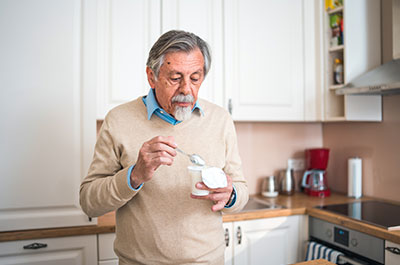Before the COVID-19 pandemic, you probably didn’t think twice about whether you were washing your hands and home correctly. (After all, it’s second nature—you’ve been doing it routinely for years, right?) Yet the pandemic is illuminating steps that many people may not be doing correctly—and now more than ever it’s important to ensure that your home, surfaces, and frequently touched objects have been thoroughly disinfected to prevent the spread of COVID-19.
We’ll start with the basics: There’s a difference between disinfecting and cleaning, says Odaliz Abreu Lanfranco, M.D., an infectious disease specialist with Henry Ford Health. Disinfecting uses chemicals to kill pathogens (like COVID-19), while cleaning uses soap and water to visibly remove dirt and germs from surfaces. Cleaning kills some germs, but not as many as disinfecting does.
Right now, it’s essential not only to clean but to disinfect high-touch surfaces frequently. “High-touch surfaces include countertops, refrigerator handles, doorknobs, phones, keyboards—anything you are in close contact with,” says Dr. Abreu Lanfranco. “Every time you leave your house, disinfect all of the objects you take and bring back with you. This includes your keys and wallet. Always make the assumption that whatever you touch, or whatever you bring into the house, is contaminated.”
To ensure you’re disinfecting surfaces properly, he shares important tips to know:
- Not all cleaning products are created equally. Natural household cleaning products aren't recommended, Dr. Abreu Lanfranco says, because they haven't been tested for effectiveness against COVID-19. "We don't have a standard set in place to say that they work against COVID-19, so we can't make any assumptions," he says. Instead, the Environmental Protection Agency (EPA) put together a list of household cleaning products that are effective in killing COVID-19 pathogens. Products from Lysol, Clorox, and Seventh Generation are some of the commonly known brands included.
- Read the instructions thoroughly. In order for disinfectants to be effective, they must be used correctly. Most importantly, take note of how long the particular product must sit on the surface. (For example, Lysol Disinfectant Spray must remain wet on the surface for three minutes and then allowed to air dry.) "This is because the walls of the viruses and bacteria need time to break down," says Dr. Abreu Lanfranco. "It basically means they are not killed immediately upon contact with the chemical."
- In a pinch, make your own disinfectant with bleach. The CDC recommends mixing five tablespoons of bleach per gallon of water or four teaspoons of bleach per quart of water. Just make sure the bleach hasn't expired.
- Protect your skin with gloves. Contact dermatitis (or skin rashes) can become common with frequent exposure to chemicals. You can even get it from washing your hands often, which you may have already noticed these past few months.
- Treat electronics with care. When disinfecting electronics (phones, keyboards) you can use products containing at least 70% alcohol.
- When cleaning with soap and water, know that rubbing helps to eliminate germs. It creates friction to help break down pathogens. This goes for both cleaning surfaces and your hands, and it's why vigorous hand washing for at least 20 seconds is recommended.
- Store properly and keep out of reach of children. Cleaning products can be dangerous if used improperly—and you should never ingest them.
Get into a routine of practicing these cleaning and disinfecting behaviors daily—for example, after going to the grocery store, gas station, or work, if you’re an essential worker—and soon enough, it will become habit. The more frequently you do it, the higher the chance that you’ll prevent the spread of COVID-19.
If you're experiencing symptoms and are concerned about possibly having COVID-19, use this online screening tool to help you learn more about your risk and get recommended next steps.
For up-to-date information about Henry Ford Health's response to the coronavirus, visit henryford.com/coronavirus.
Dr. Odaliz Abreu Lanfranco specializes in infectious diseases and sees patients at Henry Ford Hospital in Detroit.



